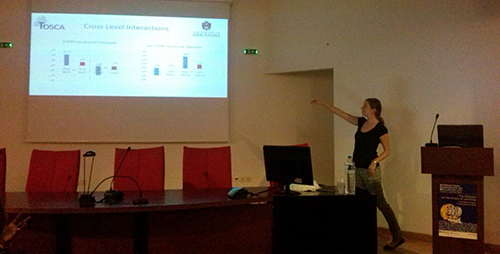
Jenna Cambria, a University of Arkansas assistant professor of educational statistics and research methods, recently organized, chaired and presented a paper in a symposium in Thessaloniki, Greece, on gender and motivation for STEM professions (science, technology, education and mathematics) at the 15th biannual International Conference on Motivation.
The symposium on Aug. 27 was part of a specialized conference of the European Association for Learning and Instruction hosted by Aristotle University. This conference brings together hundreds of researchers from around the world to present research and facilitate interaction among the international scientific community studying motivation, emotion and self-regulation.
Cambria joined the faculty of the Department of Rehabilitation, Human Resources and Communication Disorders in the College of Education and Health Professions last January.
Dionne Cross Francis of Indiana University served as the discussant, and the session included four papers contributed by leading researchers in the field from University of California, Irvine, University of Arkansas, University of Tuebingen (Germany), and University of Bonn (Germany). Cambia's paper covered a study of gender differences in the relations between individual achievement and STEM vocational interests and showing the enhancing effect of a high performing class for individual boys' STEM interests (while classroom level achievement was unrelated to interests for girls).
The other papers:
-
A longitudinal study of gender differences in career aspirations and attainment in non-STEM areas, medicine, and mathematically intensive STEM areas from ages 12-23
-
A longitudinal naturalistic study of a school reform in Germany showing that changes in state course requirements closes the gender gap in mathematics achievement in the state and affect mathematics motivation
-
A study that showed that the differential associations between high school boys' and girls' aptitudes in English and math with human services and mathematically intensive career aspirations are mitigated by math and English perceived abilities and task values.
The session closed with an engaging discussion between the presenters, leading senior researchers and early career researchers on topics related to gender and STEM that led to future research ideas and collaborations.
Topics
Contacts
Heidi S. Wells, director of communications
College of Education and Health Professions
479-575-3138, heidisw@uark.edu